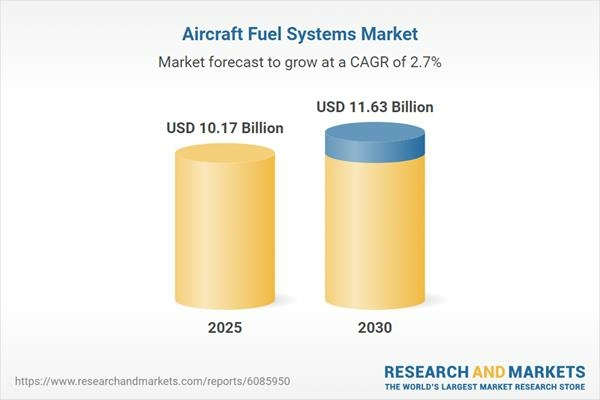AeroGenie — Your Intelligent Copilot.
Trending
Categories
Aircraft Fuel Systems Market Outlook 2025–2030 with Analysis of Eaton, Collins Aerospace, and Robertson Fuel Systems

Aircraft Fuel Systems Market Set for Steady Growth Through 2030
The global aircraft fuel systems market is anticipated to expand from USD 10.17 billion in 2025 to USD 11.63 billion by 2030, reflecting a compound annual growth rate (CAGR) of 2.7%, according to a recent report published by ResearchAndMarkets.com. This growth is primarily driven by increasing demand for next-generation aircraft, advancements in fuel monitoring technologies, and a heightened focus on sustainable aviation practices.
Market Drivers and Emerging Trends
Technological innovation remains a key catalyst for market expansion. The adoption of advanced fuel monitoring systems, lightweight composite fuel tanks, and electronic fuel management solutions is significantly enhancing operational efficiency while contributing to emissions reduction. Concurrently, green aviation initiatives are gaining momentum, with the industry witnessing a growing emphasis on sustainable aviation fuels and hybrid-electric propulsion systems. These developments are further supported by government investments, particularly in defense aviation upgrades.
Strategic alliances and acquisitions are also shaping the competitive landscape. Collaborations among original equipment manufacturers (OEMs), system integrators, and technology vendors are accelerating the deployment of next-generation fuel systems. A notable example is Eaton’s $1.6 billion acquisition of Ultra PCS, which has bolstered its market position and expanded its technological capabilities.
Segment Analysis
The conventional engine segment, which includes turbofan, turboprop, turboshaft, and piston engines, is expected to retain the largest market share. This dominance is attributed to the reliability and well-established infrastructure supporting these engines across commercial, military, and general aviation sectors. Although interest in hybrid-electric and hydrogen fuel cell propulsion technologies is increasing, these remain in the early stages of development.
Fuel control and monitoring systems represent the fastest-growing segment within the market. The rising demand for intelligent systems that optimize fuel flow and provide real-time monitoring is driven by fleet upgrades, new aircraft deliveries, and retrofit programs. Additionally, the aftermarket segment is projected to command the largest share of the market. Operators are investing heavily in maintenance, repair, and replacement of fuel system components to support aging fleets. Regulatory compliance, efficiency mandates, and sustainable fuel requirements are further encouraging overhauls and retrofits.
Regional Outlook and Industry Challenges
The Asia Pacific region is poised to experience the most rapid growth, fueled by robust economic development and increasing air travel demand. Significant investments in aviation infrastructure across China, India, Japan, and South Korea are leading to higher aircraft orders and the adoption of innovative fuel systems.
Despite these positive trends, the market faces several challenges, including supply chain disruptions, escalating raw material costs, and stringent regulatory requirements. In response, industry players are intensifying investments in technology aimed at improving fuel efficiency and safety. Competitive strategies such as mergers, acquisitions, and partnerships are being employed to enhance product portfolios and expand market reach.
Leading Market Participants
Prominent companies operating in the aircraft fuel systems market include Eaton Corporation (Ireland), Parker Hannifin Corporation (United States), Woodward Inc. (United States), Honeywell International Inc. (United States), Collins Aerospace, and Robertson Fuel Systems. As the industry continues to navigate evolving regulatory frameworks and technological advancements, strategic collaboration and innovation remain essential to sustaining growth and addressing the complex demands of modern aviation.

Capital A Completes Sale of Aviation Business to AirAsia X

Four Gateway Towns to Lake Clark National Park

PRM Assist Secures €500,000 in Funding

Should Travelers Pay More for Human Support When Plans Go Wrong?

InterGlobe Aviation Shares Rise 4.3% Following January Portfolio Rebalancing

Key Market Segments Shaping Airline Route Profitability Software

Locatory.com Gains Traction Among Aviation MROs and Suppliers

JetBlue Flight Makes Emergency Landing Following Engine Failure

58 Pilots Graduate from Ethiopian University

The Engine Behind Boeing’s Latest Widebody Aircraft
